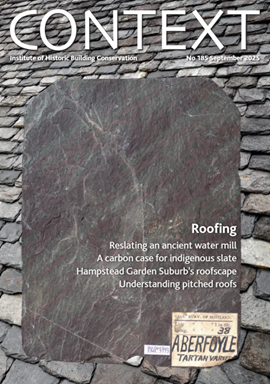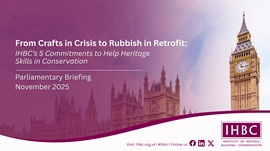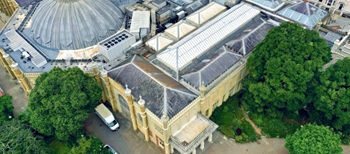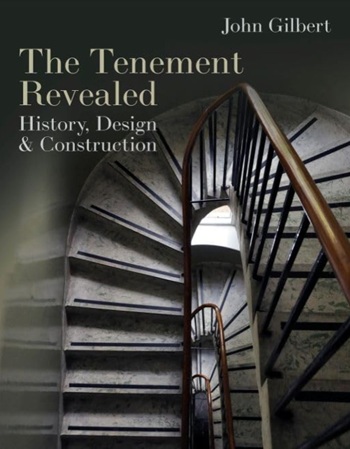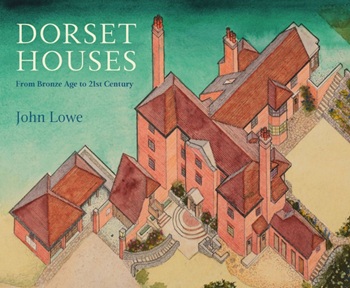IHBC NewsBlog
Latest IHBC Issue of Context features Roofing
Articles range from slate to pitched roofs, and carbon impact to solar generation to roofscapes.
Three reasons not to demolish Edinburgh’s Argyle House
Should 'Edinburgh's ugliest building' be saved?
IHBC’s 2025 Parliamentary Briefing...from Crafts in Crisis to Rubbish Retrofit
IHBC launches research-led ‘5 Commitments to Help Heritage Skills in Conservation’
How RDSAP 10.2 impacts EPC assessments in traditional buildings
Energy performance certificates (EPCs) tell us how energy efficient our buildings are, but the way these certificates are generated has changed.
700-year-old church tower suspended 45ft
The London church is part of a 'never seen before feat of engineering'.
The historic Old War Office (OWO) has undergone a remarkable transformation
The Grade II* listed neo-Baroque landmark in central London is an example of adaptive reuse in architecture, where heritage meets modern sophistication.
West Midlands Heritage Careers Fair 2025
Join the West Midlands Historic Buildings Trust on 13 October 2025, from 10.00am.
Former carpark and shopping centre to be transformed into new homes
Transformation to be a UK first.
Canada is losing its churches…
Can communities afford to let that happen?
131 derelict buildings recorded in Dublin city
It has increased 80% in the past four years.
Featured articles
The first line of defence against rain, wind and snow.
Sir John Betjeman’s love of Victorian church architecture.
Could AI and VR cause an increase the value of heritage?
AI for the conservation professional
A level of sophistication previously reserved for science fiction.
Brighton Museum’s roof lantern
Replacing a time-expired rooflight with an insulated solid roof.
Nineteenth-century conservation thinking
Ruskin’s approach emphasised original fabric and authenticity.
History, design and construction. Book review.
Making the link between conservation and new ideas.
No other minister has done as much for conservation.
Celebrating half a century of campaigning.
Dorset Houses: from Bronze Age to 21st century
A profusion of handsome and elegant houses. Book review.
John Ashurst: practitioner, writer and educator
A giant in the field of building conservation.
Not an outpouring of affection for the English cottage. Book review.
.
About IHBC
The Institute of Historic Building Conservation (IHBC) is the professional body for building conservation practitioners and historic environment experts.
With services and practice standards focussed on professionalism and continuing professional development (CPD) the IHBC provides resources for members as well as the wider public:
helps you find a knowledgeable professional
alerts to quality job openings in the sector
updates on sector news
notifies of upcoming training, events, and other sector opportunities
find out more about IHBC membership.
The IHBC exists to establish, develop, and maintain the highest standards of conservation practice, to support the effective protection and enhancement of the historic environment, and to promote heritage-led regeneration and access to the historic environment for all.
Organised through a network of regional and national branches throughout the UK, IHBC members come from a range of professional disciplines in the public, private, and voluntary sectors, including conservation officers, planners, architects, engineers, regeneration practitioners, academics, and more. Find out more on how to join the IHBC.
[edit] About Conservation Wiki
Conservation Wiki is part of the Designing Buildings Wiki platform created to make construction industry knowledge freely available to everyone. Anyone can create articles about subjects they know and find articles about subjects they don't.
Conservation Wiki is operated by the Institute of Historic Building Conservation. It provides a platform for sharing knowledge about the conservation of the built and historic environment, including traditional and modern buildings, conservation areas, historic high streets, and more.
Click here to see a list of all the articles on Conservation Wiki.
To find an article, just type your subject into the search box. Conservation articles will appear first in the search results, then related articles form the rest of Designing Buildings Wiki. To create an article, first register, then click 'Create an article'. To add your article to Conservation Wiki, tick the 'Conservation' category at the end of the article before you save it. To add your profile to articles you write, just insert your signature. You can also edit and improve existing articles by clicking 'Edit this article'. If 'Edit this article' does not appear above an article, you may have reached your 5-edits-a-day limit, in which case, just register or log in to continue, or the article may have been protected by its author. If you want to comment on an article, click 'Add a comment' at the end of the article.
Where there are articles on Conservation Wiki that are owned and maintained by the IHBC, they are protected from editing and linked to their original source on the IHBC website. Comments on these articles can be emailed to IHBC’s Professional Services Officer, Michael Netter, at [email protected]. Other articles on Conservation Wiki do not necessarily reflect IHBC policy or practice.
For more information have a look at the Designing Buildings Wiki quick start guide, or go to the Designing Buildings Wiki help page.





